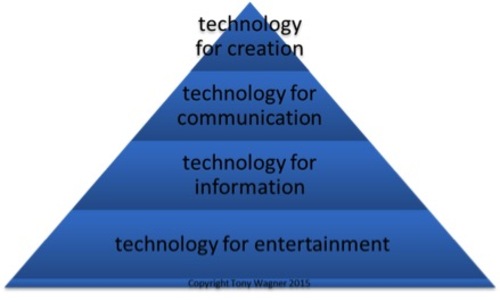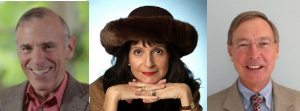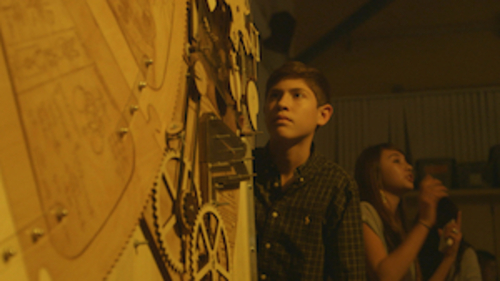
"The study of ecology will replace other required science courses and will be combined with learning math and social science, as needed. Students will best learn principles of ecology, fundamentals of math, and key social science concepts by studying real environmental issues, both locally and globally." -- Dr. Tony Wagner
The Global Search for Education consistently focuses on how to better prepare students for the 21st century -- an age which will be all about innovating and building. Today, we've invited education expert Tony Wagner and entrepreneur and filmmaker Ted Dintersmith to imagine the school of the future.
Tony is currently the Expert In Residence at Harvard University's Innovation Lab. Previously he has worked as a high school teacher, K-8 principal, university professor, and founding executive director of Educators for Social Responsibility. He is also the best-selling author of Creating Innovators: The Making of Young People Who Will Change the World, and The Global Achievement Gap.
Ted is focused on issues at the intersection of innovation and education. He produced the documentary, Most Likely To Succeed, which premiered at Sundance 2015, and which Education Week called "among the best edu-documentaries ever produced." Most Likely To Succeed is currently being screened in schools all over the country.
Tony and Ted's critically acclaimed book, Most Likely to Succeed: Preparing Our Kids for the Innovation Era, presents a new education vision which puts creativity, imagination, passion and initiative at the heart of the learning process in order to prepare kids for today's world.
Gentlemen, how will the school of the future be more environmentally conscious?
Tony: It will have the challenge of sustainability as a fundamental organizing principle of its interdisciplinary science curriculum. The study of ecology will replace other required science courses and will be combined with learning math and social science, as needed. Students will best learn principles of ecology, fundamentals of math, and key social science concepts by studying real environmental issues, both locally and globally. Availability and quality of water resources will be the most frequent problem that students will study.
Ted: Lots of students are concerned about healthy food. I get excited when I visit a school that is encouraging student-driven initiatives around what can be produced onsite, how offerings can be optimized given a food budget, and how to encourage all students to take food seriously. Or how to reduce the overall carbon footprint of the school and its community. Kids will learn so much more -- biology, chemistry, math, economics, etc. -- when it's tied to a project they create that seeks to make progress on something they care about.
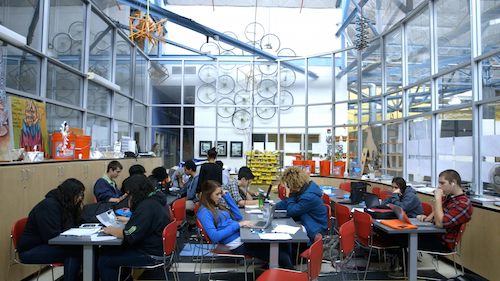
"One of the most powerful classroom experiences I've observed in recent years was a ninth-grade social studies class at Beaver Country Day in Chestnut Hill, MA. The students were asked to analyze what steps the U.S. should take in dealing with the insurgent revolution in Syria." -- Ted Dintersmith
How will the school of the future be more globally inclusive?
Ted: One of the most powerful classroom experiences I've observed in recent years was a ninth-grade social studies class at Beaver Country Day in Chestnut Hill, MA. The students were asked to analyze what steps the U.S. should take in dealing with the insurgent revolution in Syria. They scrambled and found a classroom in Damascus with Skype capabilities, set up a class-to-class Skype call, and got feedback directly from the students there. The perspective these students had on U.S. foreign policy was more informed than that of many adult journalists in our country reporting on developments there. Imagine this approach being used more broadly, and how it might transform history, social studies, foreign language, and perhaps even science classes here.
Tony: The school of the future will take as a fundamental premise that understanding and appreciation of diverse cultures is an essential educational outcome for all students. Students will frequently partner, via technology, with teams of students from other countries to better understand both local and global issues from multiple cultural perspectives. To use my earlier example, students might come to better understand how challenges related to water quality and availability are impacted by culture, politics, and geography.
How will technology be integrated into the curriculum and how will the school handle the integration of continual advancements in technology?
Ted: The important advance we need to make is to focus on education experiences that recognize what is readily available to any of us on our smartphone, and not re-invent the wheel. For example, I've seen a math class that lets kids use smartphones for low-level procedures (with some exposure on poorly-constructed standardized tests) to make room for time to take on challenges like coming up with a sound way to predict the world's population in 2100.
Tony: Just as successful schools today employ Bloom's Taxonomy of Learning, schools of the future will understand and employ what I call a new Taxonomy of Technology as an essential tool of learning and creation.
What will be left of traditional craft work and writing?
Ted: When formulaic writing can be done by advanced software, few adults will be able to contribute to society by being mediocre writers. A compelling written voice will be able to make a difference, so our goal with students needs to be to help them develop a distinctive and powerful written voice.
Tony: High quality craft work that cannot be replicated by machines will be in even greater demand as societies transition from acquiring a greater quantity of things to having more quality objects and experiences. Demand for beautiful, but practical products -- pottery, fiber, or wood -- will continue to increase as people seek beauty in their everyday lives. Writing skills will continue to be critical but writing will be increasingly integrated into more artistic and graphics-based presentations for a deeper understanding. Storytelling in written, animated, and movie forms will grow in popularity as people seek new ways to understand the world and one another.
Given the efficiency of the Internet and home learning, how much time will students be needed in school?
Ted: I don't believe much of anything consequential is learned strictly through online lectures and simplistic multiple-choice questions. Real learning hinges, to a very large extent, on peer interaction and the impact of engaged and inspiring adults.
Tony: Learning will increasingly be seen as an anytime, anywhere event. Instead of a diploma being a certificate of "seat time served" in a collection of courses, students will work towards earning "merit badges" representing diverse competencies - much in the way that Scouts do today - at times and places that are consistent with their learning interests and goals. When students are ready, they will present and defend their work in digital portfolios and exhibitions of mastery as the basis for learning a diploma -- much in the way that doctoral students do today.
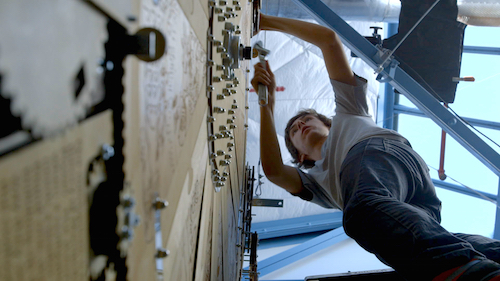
"The school of the future will take as a fundamental premise that understanding and appreciation of diverse cultures is an essential educational outcome for all students. Students will frequently partner, via technology, with teams of students from other countries to better understand both local and global issues from multiple cultural perspectives." -- Dr. Tony Wagner
How important will the presence of physical teachers be?
Ted: If we view a teacher as the subject matter expert standing in front of a class lecturing, I'd argue that they're already obsolete. But if our teachers work closely with students, provide informed and caring instruction and feedback, and help students discover their passions and purpose, they will be - for all eternity - essential.
Tony: Students will increasingly study necessary or relevant academic content independently -- often by electronic means. Teachers will be increasingly important as skilled performance coaches. They will help students learn to self-assess and will, with colleagues, determine when students have met the required performance standards necessary for a diploma. Teachers will no longer be isolated, but rather will work together with colleagues to better understand the work, learning, and citizenship competencies that students must master for their diplomas. Team-teaching will be the norm as educators come to understand that "isolation is the enemy of improvement and innovation."
Will technology advancement lead to further personalization of education to individual students or will it also increase the techno-bureaucratic need for standardization?
Ted: People who believe that an ocean of short online lectures, quick quizzes, and big data will advance education are just wrong. Very little is learned, and almost nothing is retained, with these experiences. Udacity, to its credit, pioneered the MOOC pedagogy and recognized how little real learning takes place with strictly online resources. The only reason people conclude that this form of education is effective is that they never reflect on how totally-forgettable their lecture courses were.
Tony: Technology will increasingly allow students to be the architects of their own learning. For example, imagine a student who becomes interested in bicycle design. She or he will study the relevant history, as well as the physics and math of bicycle design, learn CAD CAM and perhaps welding, and then apprentice with a team of innovators who can teach practical skills related to iteration of designs, marketing, and business principles.
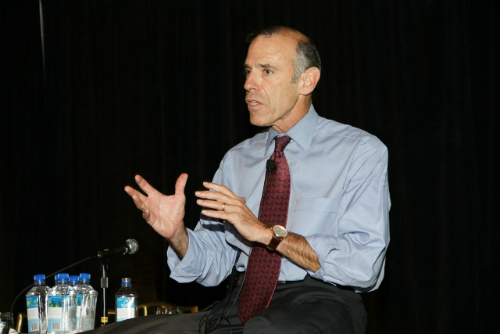
"Students will also learn stress reduction through regular classes in meditation, yoga, tai chi, etc. Perhaps more important, students will learn to listen to themselves and to reflect through one or more of these disciplines." -- Dr. Tony Wagner
Will we teach students specific "subjects" in traditional classrooms like we have today or will classes be more about integrated/hybrid learning?
Ted: Most of what's interesting in life is interdisciplinary. The subjects were defined in 1893, and those boundaries are as obsolete as the covered wagon. There are powerful options that cut across traditional school subjects. What if athletic coaches encourage their players to use math to come up with ways to predict the outcome and score of future games? To develop their own team constitution laying out how the team will make its important decisions (and, maybe, ease out of the model of coach as dictator), and tie it to the way our founders laid out our nation's constitution. There are opportunities everywhere to capitalize on passions of students to deepen engagement more broadly.
Tony: "Required" classes will be increasingly interdisciplinary, with classes organized around understanding a real problem or addressing a big question. For example, students will no longer take US History. Rather they will have a year-long American Studies course organized around a few big questions, such as: Who are we as Americans? What are the most significant influences that have shaped us as a country and a people? And what are the greatest challenges that we face in the future? Students will learn material relevant to answering these questions through history, literature, economics, social science, the arts, and music.
Faced with increasing time spent on digital devices, how can we teach more practical skills, including coping with stress levels and interpersonal conflict?
Ted: In the film Most Likely To Succeed, students are scrambling to complete their initiatives in time for Exhibition Night, and students deal with all sorts of interpersonal issues that, in a profound way, teach them skills that they'll use for the rest of their lives -- in jobs, in families, and in being productive citizens.
Tony: Students will work in teams on most assignments. Teachers will coach individual students as they collaborate with their colleagues, and students will regularly review one another's contributions to projects through "360" reviews. Students will also learn stress reduction through regular classes in meditation, yoga, tai chi, etc. Perhaps more important, students will learn to listen to themselves and to reflect through one or more of these disciplines. Increasingly, students will come to see the value of both traditional Eastern and Western ways of approaching problems.
Very inspiring - Thank you Gentleman
For more information on Most Likely to Succeed: Preparing Our Kids for the Innovation Era
(All photographs are courtesy of the Film and the Book Most Likely to Succeed)
Join me and globally renowned thought leaders including Sir Michael Barber (UK), Dr. Michael Block (U.S.), Dr. Leon Botstein (U.S.), Professor Clay Christensen (U.S.), Dr. Linda Darling-Hammond (U.S.), Dr. MadhavChavan (India), Professor Michael Fullan (Canada), Professor Howard Gardner (U.S.), Professor Andy Hargreaves (U.S.), Professor Yvonne Hellman (The Netherlands), Professor Kristin Helstad (Norway), Jean Hendrickson (U.S.), Professor Rose Hipkins (New Zealand), Professor Cornelia Hoogland (Canada), Honourable Jeff Johnson (Canada), Mme. Chantal Kaufmann (Belgium), Dr. EijaKauppinen (Finland), State Secretary TapioKosunen (Finland), Professor Dominique Lafontaine (Belgium), Professor Hugh Lauder (UK), Lord Ken Macdonald (UK), Professor Geoff Masters (Australia), Professor Barry McGaw (Australia), Shiv Nadar (India), Professor R. Natarajan (India), Dr. Pak Tee Ng (Singapore), Dr. Denise Pope (US), Sridhar Rajagopalan (India), Dr. Diane Ravitch (U.S.), Richard Wilson Riley (U.S.), Sir Ken Robinson (UK), Professor Pasi Sahlberg (Finland), Professor Manabu Sato (Japan), Andreas Schleicher (PISA, OECD), Dr. Anthony Seldon (UK), Dr. David Shaffer (U.S.), Dr. Kirsten Sivesind (Norway), Chancellor Stephen Spahn (U.S.), Yves Theze (LyceeFrancais U.S.), Professor Charles Ungerleider (Canada), Professor Tony Wagner (U.S.), Sir David Watson (UK), Professor Dylan Wiliam (UK), Dr. Mark Wormald (UK), Professor Theo Wubbels (The Netherlands), Professor Michael Young (UK), and Professor Minxuan Zhang (China) as they explore the big picture education questions that all nations face today.
The Global Search for Education Community Page
C. M. Rubin is the author of two widely read online series for which she received a 2011 Upton Sinclair award, "The Global Search for Education" and "How Will We Read?" She is also the author of three bestselling books, including The Real Alice in Wonderland, is the publisher of CMRubinWorld, and is a Disruptor Foundation Fellow.

